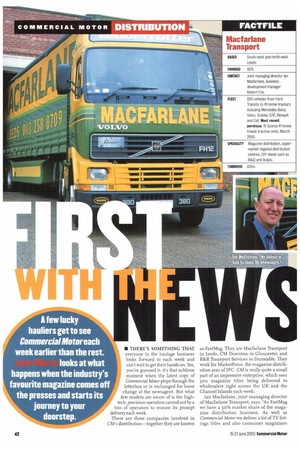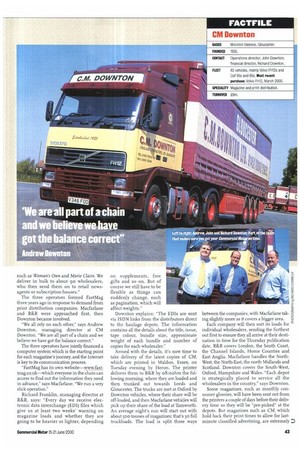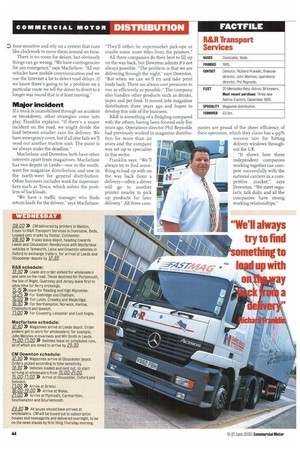• THERE'S SOMETHING THAT everyone in the haulage business looks
Page 44

Page 45

Page 46

If you've noticed an error in this article please click here to report it so we can fix it.
forward to each week and can't wait to get their hands on. Yes, you've guessed it: it's that sublime moment when the latest copy of Commercial Motor plops through the letterbox or is exchanged for loose change at the newsagent. But what few readers are aware of is the hightech, precision operation carried out by a trio of operators to ensure its prompt delivery each week.
There are three companies involved in CM's distribution together they are known as FastMag. They are Macfarlane Transport in Leeds, CM Downton in Gloucester, and MLR Transport Services in Dunstable. They work for MarketForce, the magazine distribution arm of IPC. CM is really quite a small part of an impressive enterprise, which sees 300 magazine titles being delivered to wholesalers right across the UK and the Channel Islands each week.
Ian Macfarlane, joint managing director of Macfarlane Transport, says: As FastMag we have a 30% market share of the magazine distribution business. As well as Commercial Motor we deliver a lot of TV listings titles and also consumer magazines
such as Woman's Own and Marie Claire. We deliver in bulk to about 90 wholesalers, who then send them on to retail newsagents or subscription houses."
The three operators formed FastMag three years ago in response to demand from print distribution companies. Macfarlane and R&R were approached first, then Downton became involved.
"We all rely on each other," says Andrew Downton, managing director at CM Downton. "We are all part of a chain and we believe we have got the balance correct."
The three operators have jointly financed a computer system which is the starting point for each magazine's journey, and the Internet is key to its communication process.
"FastMag has its own website—www.fastmag,co.uk—which everyone in the chain can access to find out the information they need in advance," says Macfarlane. "We run a very slick operation."
Richard Franklin, managing director at R&R, says: "Every day we receive electronic data interchange (EDI) files which give us at least two weeks' warning on magazine loads and whether they are going to be heavier or lighter, depending on supplements, free gifts and so on. But of course we still have to be flexible as things can suddenly change, such as pagination, which will affect weights."
Downton explains: The EDIs are sent via ISDN links from the distributors direct to the haulage depots. The information contains all the details about the title, issue, tape colour, bundle size, approximate weight of each bundle and number of copies for each wholesaler," Armed with the details, it's now time to take delivery of the latest copies of CM, which are printed in Malden, Essex, on Tuesday evening by Heron. The printer delivers them to R&R by o8:oohrs the following morning, where they are loaded and then trunked out towards Leeds and Gloucester. The trucks are met at Oxford by Downton vehicles, where their share will be off-loaded, and then Macfarlane vehicles will pick up their share of the load at Tamworth. An average night's run will start out with about 5 oo tonnes of magazines; that's 30 full truckloads. The load is split three ways between the companies, with Macfarlane taking slightly more as it covers a bigger area. 2
Each company will then sort its loads for individual wholesalers, sending the furthest out first to ensure they all arrive at their destination in time for the Thursday publication date. R&R covers London, the South Coast, the Channel Islands, Home Counties and East Anglia. Macfarlane handles the NorthWest, the North-East, the north Midlands and Scotland. Downton covers the South-West, Oxford, Hampshire and Wales. "Each depot is strategically placed to service all the wholesalers in the country," says Downton.
Some magazines, such as monthly consumer glossies, will have been sent out from the printers a couple of days before their delivery time so they will be "pre-picked" at the depots. But magazines such as CM, which hold back their print times to allow for lastminute classified advertising, are extremely
time-sensitive and rely on a system that runs like dodcwork to move them around on time.
There is no room for delays, but obviously things can go wrong. "We have contingencies for any emergency." says Macfarlane. All our vehicles have mobile communication and we use the Internet a lot to detect road delays. If we know there's going to be a problem on a particular route we tell the driver to divert to a longer way round that is at least moving."
Major incident
If a truck is immobilised through an accident or breakdown, other strategies come into play. Franldin explains: "If there's a major incident on the road, we might divide the load between smaller vans for delivery. We have emergency cover, but if all else fails we'll send out another tractive unit. The point is we always make the deadline."
Macfarlane and Downton both have other interests apart from magazines. Macfarlane has two depots in Leeds—one in the southwest for magazine distribution and one in the north-west for general distribution. Other business includes work for supermarkets such as Tesco, which solves the problem of backloads.
"We have a traffic manager who finds return loads for the drivers," says Macfarlane. "They'll either be supermarket pick-ups or maybe some more titles from the printers."
All three companies do their best to fill up on the way back, but Downton admits it's not always possible. "The problem is that we are delivering through the night," says Downton. "But when we can we'll try and take print loads back. There are always cost pressures to run as efficiently as possible." The company also handles other products such as drinks, paper and pet food. It moved into magazine distribution three years ago and hopes to develop this side of the business.
R&R is something of a fledgling compared with the others, having been formed only five years ago. Operations director Phil Reynolds had previously worked in magazine distribution for more than 20 years and the company was set up to specialise in this sector.
Franklin says: "We'll always try to find something to load up with on the way back from a delivery—often a driver will go to another printer nearby to pick up products for later delivery." All three corn panies are proud of the sheer efficiency of their operation, which they claim has a 99% success rate for hitting delivery windows throughout the UK.
"It shows how three independent companies working together can compete successfully with the national carriers in a competitive market," says Downton. "We meet regularly, talk daily, and all the companies have strong working relationships."












































































































